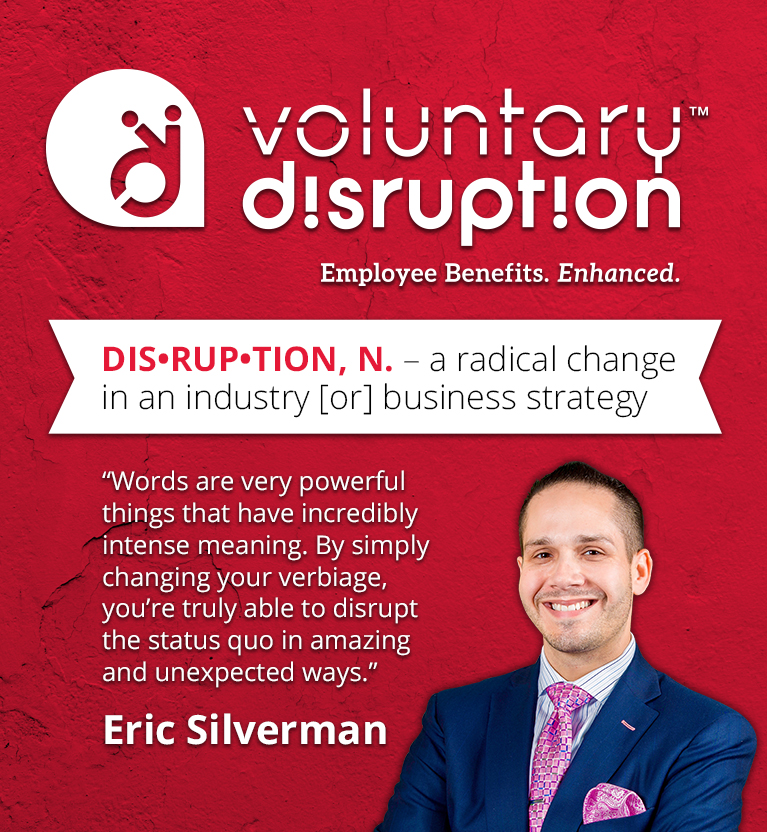Referring to employee-funded benefits as ‘voluntary,’ ‘ancillary,’ ‘supplemental’ and ‘worksite’ are hurting your sales.
Last month, I shared how I’m on a mission to disrupt the “voluntary” industry by breaking through the health insurance status-quo that employers have been accustomed to for far too long. For me, that started with leaving the voluntary benefits carrier rep lifestyle behind, and it moves forward through a constant focus on word choice.
I first learned this lesson nearly 20 years ago, speaking to employees at a 50-life case I’d just closed. I was too busy envisioning the size of the check I’d be cashing from 80 percent employee participation when in the middle of my presentation I innocently referred to the majority of their employees as “tow truck drivers.”
Highlighting the mistake I’d just made, several workers shouted that they’re in fact “auto recovery specialists.”
Oops. Although I certainly meant no disrespect, and I apologized profusely, my lack of knowledge with respect to their profession made me see the potential irreparable damage that incorrect word choice can have in my business. For one, it nearly cost me my new account.
Flash forward to the early 2000s, when I first started to form partnerships with traditional health brokers. Nearly every broker didn’t seem to care about what I now call the “enhanced benefits” industry or what most still incorrectly refer to as ‘voluntary.’ Most said there was no value in these types of products and that all their clients needed was a comprehensive health insurance program. After many meetings that went this way, I noticed that the majority of brokers kept referring to my products as “ancillary.”
The problem is, ancillary means “providing something additional to a main part or function. Supplementary,” according to Webster’s online dictionary.
Perhaps at the time, ancillary may have been a semi-reasonable descriptive. Certainly not now, in the wake of the Affordable Care Act and its impact on the market. As health insurance and care evolves, most of the health brokers who used to tell me enhanced benefits had no value and were unnecessary “ancillary” add-ons are now starting to jump feet-first into the enhanced benefits space.
At first, this was because they needed to make up for their dwindling health insurance commissions post-ACA, but now they’re increasingly losing business to direct-to-market enhanced benefit sales reps who’ve been cutting them out.
Even for those brokers who are now willing and able to install them, their challenge is that their employee participation levels are so low that it makes them question why they bothered placing the products in the first place.
Here’s what I ask them: What terminology do they use when describing these benefits to their clients?
Here’s what I continually hear back: They continue to refer to everything as ‘voluntary,’ ‘ancillary,’ ‘supplemental’ and ‘worksite.’
All this is to say, what message are you sending your clients about the new employee-funded benefits you’re proposing when you’re constantly referring to them in a negative connotation using those types of words? After all, isn’t everything “voluntary?”
The dictionary definition of the word “enhance” is “to raise to a higher degree; intensify; magnify.” Let’s not forget what the primary goal of these types of products are – to support and strengthen your clients health insurance. Thus, why “enhanced” makes more sense than any of the other illogically used words that run rampant in our industry.
Your clients’ perception is reality, so when you replace all of these negative words with a more proper definition of what you’re trying to do for your clients’ benefits package, then you’ll no doubt, close more deals and have much greater success than ever before.
Just as the way you speak about enhanced benefits impacts the way employees perceive their value, so too does the manner in which you present them for enrollment. Now that you’ve mastered proper word choice, next month I’ll share three easy ways to succeed during your next enhanced benefits open enrollment. Until next time, don’t just have a great month – make it a great month!

